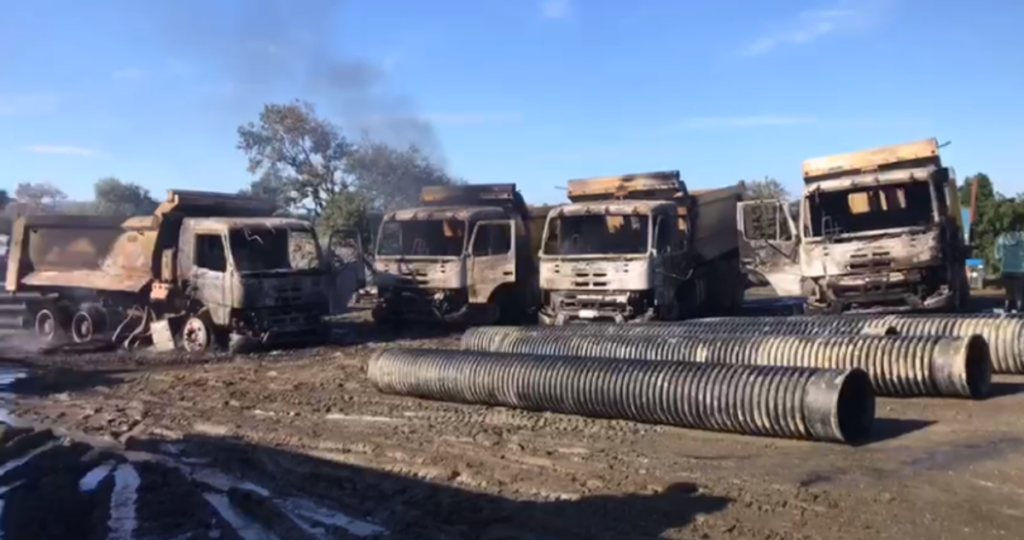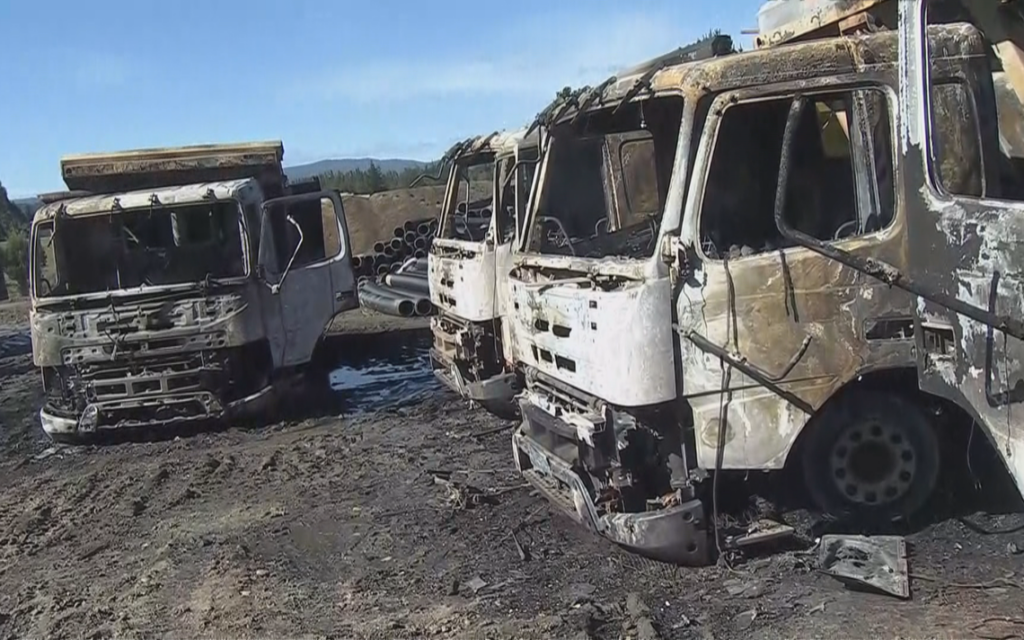
Los Álamos (Chile), April 28, 2022: thirty-three trucks and construction machinery destroyed by fire in an attack against the forestry industry
via:sansnom
On Thursday, April 28, 2022, a group of 40 people from the group Resistencia Mapuche Lavkenche (RML) attacked several logging companies in the municipality of Los Álamos in the early morning, in the region of Bío Bío (Chile). Thirty-three dump trucks, backhoes, front-end loaders and other vans surrendered to the flames in less than three hours, while the two access roads to the companies (Trongol road and Pilpilco road) were blocked either by burning trucks moved there or by barricades of felled trees. This coordinated attack was described by the Chilean press as the most significant “since the resumption of the violent struggle by radical Mapuche groups in 1997.”
Needless to say, the forest devastation companies (such as the Asociación de Contratistas Forestales) immediately demanded the extension of the state of emergency established in October 2021 in all of southern Chile, which had ended on March 16 with the new left-wing government of Gabriel Boric. It should be noted that in the north of Chile, the same state of emergency (Estado de Excepción) with military intervention to support the police, established last February, has been maintained on the border with Bolivia and Peru. But the arrival of migrants from Venezuela in the north is not the prolonged struggle of a part of the Mapuche in the south to recover the land and drive out the exploiters, with whom the Chilean state is trying to re-establish dialogue. And the new Minister of the Interior Iskia Siches will not deny this, she who on March 15, in her first days in office, had the bad idea of trying to calm the conflict with a symbolic gesture, going to the community of Temucuicui (Araucanía region) to meet with the father of Camilo Catrillanca, a young peasant shot in the head in November 2018 by the Special Operations Group of the Carabineros responsible for restoring order.
 Temucuicui (Ercilla), March 15, 2022: car set on fire on a bridge, shots fired and trees cut down to welcome the Minister of the Interior
Temucuicui (Ercilla), March 15, 2022: car set on fire on a bridge, shots fired and trees cut down to welcome the Minister of the Interior
A bad idea, because any possibility of dialogue and pacification had been refused by a part of those who live there, by starting to shoot at her car and cutting down trees to block her delegation, while a burnt car blocked a bridge near a banner that said: “Izkia Siches, as long as there are Mapuche political prisoners, there will be no dialogue. For Kamilo Katrillanca and all those who have fallen in battle. In Wallmapu, we will not accept any bribe from a murderous state. Latifundists and loggers out. Basta militarization. Resistencia Mapuche.” Izkia Siches then had to turn back and carry this public humiliation of the Chilean State, which is not nothing, because this 36-year-old surgeon, now Minister of the Interior, is supposed to embody 1, half Aymara, raised in Maipú, educated in a crappy school that no one knows about,” she said, for example, playing on both identity and class. Except that now she is Minister of the Interior and that is the only thing that matters…] all the progressivism of the new government in charge of definitively liquidating the Mapuche question, through a mix of repression and integration.
On April 29, the day after the coordinated attack on Los Álamos 2, Salvador Millaleo, the political and strategic coordinator for indigenous affairs at the Chilean Ministry of the Interior, who had accompanied Izkia Siches on her unsuccessful visit to Temucuicui, resigned from his post. And with him, the whole plan of integration and pacification of the Mapuche concocted for months behind the scenes by the Left is in the hot seat: multinationality, economic autonomy and election of indigenous authorities, operations of repurchase of lands with compensation to the latifundists, and new regulations for the forestry operators.

Los Álamos, Chile, April 28, 2022
If for the moment President Boric has declared that he does not want to re-establish the state of emergency in Mapuche territory, he has nevertheless announced an immediate reinforcement of security in the region with a first envelope of 6 million euros, not to mention his other small worries such as the high school and student demonstrations which do not cease, and during which the police have already wounded a young person with a bullet on March 25 in Santiago. On that occasion, Boric logically declared, as any head of state would, “in this government, the students who want to dialogue will have an open door. Those who want to burn down buses or use violent means will have to answer to the law”… after sending an initial clear signal to everyone since his election: to keep the much hated Ricardo Yáñez in office as National Director of Order and Security appointed by his predecessor, the same one who crushed the revolt of October 2019 in blood when he was Director General of the Carabineros, leaving about 30 dead and thousands injured (1400 of them by police shootings and 285 who were blinded, not to mention the hundreds of rapes in the barracks and police stations).
 Santiago, April 25, 2022: an armored carabinieri vehicle was attacked with molotovs in front of the Instituto Nacional high school. On April 27, youths also burned a bus after removing the driver and passengers from the Liceo Barros Borgoño.
Santiago, April 25, 2022: an armored carabinieri vehicle was attacked with molotovs in front of the Instituto Nacional high school. On April 27, youths also burned a bus after removing the driver and passengers from the Liceo Barros Borgoño.
But if there is one thing that some of the Mapuche groups in struggle have learned (often to their expense) during years of fighting to recover the land, it is that in the face of the coldest of cold monsters… nothing beats direct action, if one wishes to live autonomously outside of the statist and capitalist shackles.
[Synthesis of the Chilean press, May 1, 2022]
 Los Álamos (Chile), April 28, 2022
Los Álamos (Chile), April 28, 2022
The details and chronology of the 5 attacks that destroyed more than 30 vehicles in Los Álamos
translated from Spanish by Radio Bío Bío (Chile), April 28, 2022 (excerpts)
Initially, there was talk of at least four trucks being destroyed, a figure that quickly rose to 12, then 25 and finally 33, considering forestry and wood aggregate trucks, as well as heavy machinery and cars. The event was reported as a major act of violence, and the investigation stated that there were five attacks in the same area.
* At 8:20 a.m., two burned vehicles were found across the access road to the Trongol sector: an aggregate truck and a forestry truck.
* Around 9:30 am, and after the events, the carabinieri arrived at the scene of the event to begin to identify the multiple points attacked.
The first was the aggregates company Serfocom, where a truck, a backhoe and a front-end loader were destroyed. At the same location, unknown persons stole two white pickup trucks, one Chevrolet and the other Maxus.
* At 9:38 a.m., uniformed officers identified a third attack. It was the Tramza aggregate company. At the site, 24 vehicles were set on fire: four pickup trucks, one car, 15 dump trucks, three logging trucks and a front-end loader. In addition, another loader was damaged by bullet holes and an attempted arson.
* At 10:10 a.m., the carabinieri found a fourth aggregates company under attack. On this occasion, an excavator and a dump truck were set on fire, in addition to damage to the windows and the beginning of a fire in the prefabricated building used as a canteen and toilet.

* Ten minutes later, police found a fifth act of violence with a private dump truck set on fire, specifically on Trangol Road, mile 1 of Route 436. Carabinieri reported that a Toyota truck was stolen from the same location.
* Finally, at 10:30 a.m., a roadblock due to fallen trees was identified on Pilpilco Road. Thirty minutes later on the road P-404, unknown persons fired shots at the forestry company Forestal Antilemu. There was no damage or injuries.
In total, there were five attacks, a roadblock and at least two shots fired against forestry companies in less than three hours.
To go further
About the current struggle in Mapuche territory, one can consult the recent collection Entre océans, forêts et volcans (ed. La Souterraine, spring 2022), which emphasized in its introduction: “It is a conflict where the anti-industrial critique and the refusal of capitalist development succeeds in bringing to life a different world, a world of autonomous communities that try to live in and with nature, and not on its back. Of course, these communities are not free of hierarchical structures, nor of creating oppressions within them, and their organizations of struggle are also crossed by hierarchies, divisions based on gender, tendencies towards hegemony or distrust towards other more anarchist expressions of radical struggle against the state and industrialism. But they certainly do not have the cult of state domination, of the exploitation of fauna and flora, of a mad rush towards an ever more artificial world and towards an ever more assisted life”.
- “I’m a woman, young, left-wing, brown-skinned, from Arica [a port city in northern Chile with a desert climate ↵
- In its April 29 communiqué, Resistencia Mapuche Lavkenche (RML)/Lavkenmapu-Nahuelbuta, stated in part:
“The reasons for this attack respond to the damage that the company Tramsa, headed by Juan Ramirez, has caused in the Trongol River, whose waters have been invaded for years by its capitalist machinery, destroying the flora and fauna of this area of Nahuelbuta, irreversibly affecting the lives of the Mapuche people and poor Chilean peasants who live there. To attack this subcontractor is to attack Forestal Arauco of the Angelinni group, whose company participates in this extractivist chain. Tramsa has always participated in the interests of this forestry company, building roads for its operations for years, destroying our mapu. It has dried up the tributaries of the rivers, changing the course of their waters, killing the Mapuche itrovil mongen (biodiversity) and the lives of the people who depend on the Trongol River. We have made it clear to the winka (invader) government of Boric that capitalist development is not compatible with the lives of the Mapuche. That the logging companies have had their day in Wallmapu, because we will continue to expel them. That the rivers are free, as are the Mapuche.” ↵
